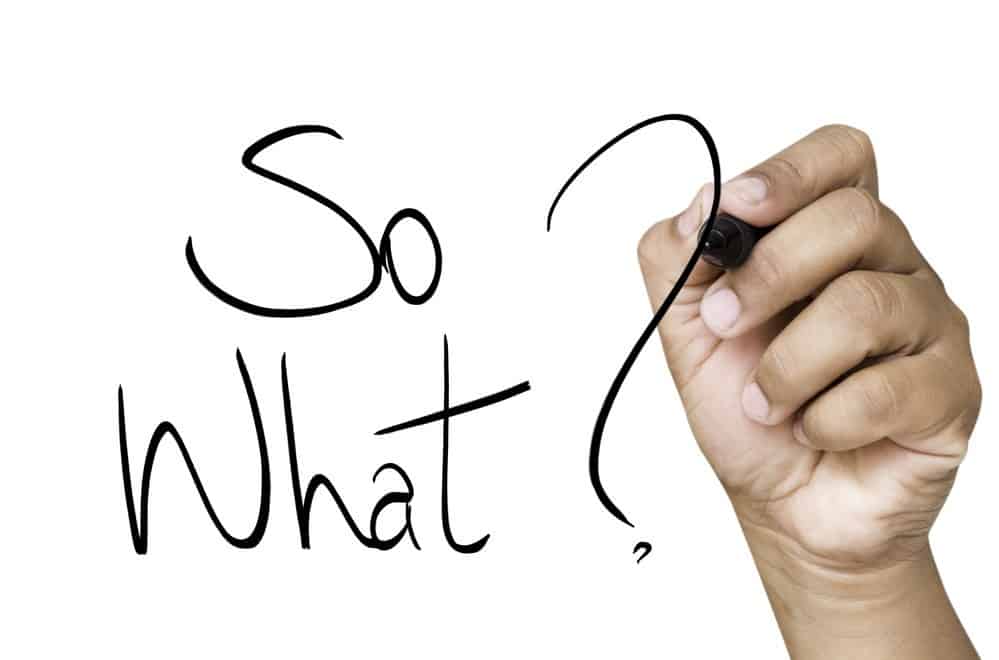I have to admit it, after all this time, I still can’t understand why so many otherwise intelligent people make themselves look like absolute idiots by arguing on the internet.
This week, I’m looking at my Facebook feed—perhaps I shouldn’t, because I can’t help but see a stream of idiots arguing with other idiots.
Not only does everyone think they are right, but they think the issues they are arguing about are actually important.
Now, don’t get me wrong. There are plenty of important issues out there, but most of those issues don’t individually affect the people arguing for or against them—at least not on a daily level.
Often we are tempted to jump into a conversation or project a viewpoint that we hold—an opinion—because we feel that expressing ourselves or convincing others of that viewpoint is important. But in reality, even if we are successful, it will have a negligible impact on our own life.
On the other hand, guess what will have a big impact on our life?
- The time we take to argue on the internet, which we could be using to do much more productive things
- The emotional and physical energy we expend getting distressed over things that don’t matter all that much in the grand scheme of things
- The friendships and business relationships we ruin or alienate by choosing to act in an emotional matter instead of a logical one
- The historical footprint of our own opinion we leave, which may change in the future, but for now is cast in stone
Why do you care so much?
 So there are injustices in the world—what a shocker.
So there are injustices in the world—what a shocker.
Did you know that the world isn’t fair and that arguing on Facebook won’t make it fair?
I know it feels like the whole world is coming to an end because Bob said something racist and Mary is a bigot who believes a pack of lies, but is it really your job to tell them that they are wrong?
Will they even listen? And if they do, will it even matter?
I’m not saying we shouldn’t care about things. I’m saying we should care about things by devoting actual valuable resources to them like time and money, not just inflammatory words on Facebook.
I see a lot of otherwise intelligent people getting caught up in what can only be described as unnecessary drama.
Suddenly, professional people who are supposed to be leaders setting examples in our industry are butting into things that they don’t belong in and slinging mud.
Again, don’t get me wrong—there are a ton of bad and wrong things in this world, and we all have different opinions on what they are. But how many of those things really affect us on a day-to-day basis?
How many of the things you get so upset about will ever affect you in your life, ever?
And even if these things you are so upset about do affect you, why do you care if someone on your Facebook friends list thinks differently or completely opposite of you?
Wouldn’t your life be a lot better off if you, perhaps, didn’t care so much?
It’s not just about caring less…
It’s about choosing what to care about.
If you choose to react to every perceived slant or social injustice and react in a matter that alienates others, you will find yourself becoming a bitter, grumpy, and pessimistic person.
Tolerance is not about love or agreement. It’s about letting people be and not harassing them because of it.
The highest form of hypocrisy that I can imagine is being intolerant to intolerant people.
It’s like the pot calling the kettle black.
If you really want to practice tolerance, practice a little bit of “shut the hell up.”
The most tolerant any person can be is when they shut their mouth; when they choose to not pronounce judgment one way or the other.
If you cheer when your side wins, you are not tolerant.
If you bitch when your side loses, you are not tolerant.
If you think there is a side, you are not tolerant.
The moment you post that link to that news article that shows you are right or how someone else is stupid or wrong, you have decided to give up on being tolerant and moved towards becoming a tyrant.
People can think what they want, people can be what they want—they can even hate what they want—but the moment you decide you are on a higher moral ground and share that with the world, you have given up your right to claim tolerance.
And maybe tolerance isn’t always a good thing. Maybe there are things we shouldn’t tolerate. But, even if that is true, it’s important to choose your battles correctly. You should always be asking yourself…
Is this really the hill I want to die on?

Popular opinion can move against you really fast and the words you write are as good as written in stone.
Don’t believe me? Think I’m being a little extreme?
Just ask the victims of McCarthyism, who suddenly had their once acceptable and even popular political opinions turned against them.
The world can be a fickle bitch. One day it will lift you up on its shoulders, and the next day it will slam you into the ground and take a piss on your corpse.
Heroes and villains are often only demarcated by popular opinion, so you should think carefully before you commit an opinion you have into the eternal, unforgetful archives of the internet—it might come back to bite you.
Before you open your mouth, before you type into that little comment window, ask yourself, and ask it again: is this the hill I want to die on?
Is it really worth expressing my opinion here?
It is really worth getting emotionally invested and potentially alienating a group of people, or making enemies?
Do I really want to commit these words or my current opinion to the annals of history, where they can never be removed?
Forever is a pretty long time, but we are no longer writing a clay tablet that can be shattered with no trace remaining. When you write or post something on the Internet, it’s there for good.
A broader lesson

Yes, you can hurt your career by pissing off the wrong people on your social networks.
Yes, you can destroy your personal brand by being a drama queen in public.
But, you can also cause a similar amount of destruction in your career with the smaller-scale politics that happen in your work environment.
I see too many programmers become far too emotionally invested in things that aren’t all that important.
I, myself, have been guilty of arguing for or against some technology or way of solving a problem that really didn’t matter that much at all—especially as far as I was concerned.
I’ve made the mistake of getting caught up in inter-office politics and discussions that I’m be embarrassed to say I wasted my emotional energy or time on.
In everything, in life, we are often better off if we can learn to practice a little discretion.
We don’t always have to say what is on our minds.
We don’t always have to share our opinions.
In fact, we don’t always have to have an opinion.
Sometimes it’s better to use some just-in-time judgment and not form an opinion until it’s absolutely necessary to have one.
I’m reminded of the story of a man who, when asked if he could play the piano, replied with: “I don’t know, I’ve never tried.”
What if we completely withheld judgment on issues and drama that don’t matter to us?
What if we just buckled down, did our work, and ignored the emotional distractions that everyone is trying to bait us into?
I’m not saying I’m perfect—I’m far from it—but I know enough to realize I’ve never seen any good come from an internet argument, only bad.
I also have known the same to be true about most office arguments. Quite often drama is created solely for the sake of drama and nothing else.
It’s your choice whether or not you get sucked into the drama around you.

These people often paint themselves as victims, and you are drawn in because you feel sorry for them.
But do not be deceived. Do not get involved.
Programming and politics don’t mix.
Productive programmers know how to avoid drama at all costs, reserve their judgment for matters of importance, and only express those judgments in forums where they will not fall on deaf ears.
If you are looking for additional resources that might help you on your quest to stop caring so much, I’d recommend two books:
- 7 Habits of Highly Effective People – An overall good book with sound principles, but specifically deals with focusing on your own sphere of influence and not focusing on things that you can’t control or don’t matter.
- The Power of Now – A bit of a strange book. I don’t agree with everything in it, but there are some really good parts about not caring about everything that is going on and focusing on what is important.
- Essentialism – Great book about focusing on what is important. This one really made me think hard.
